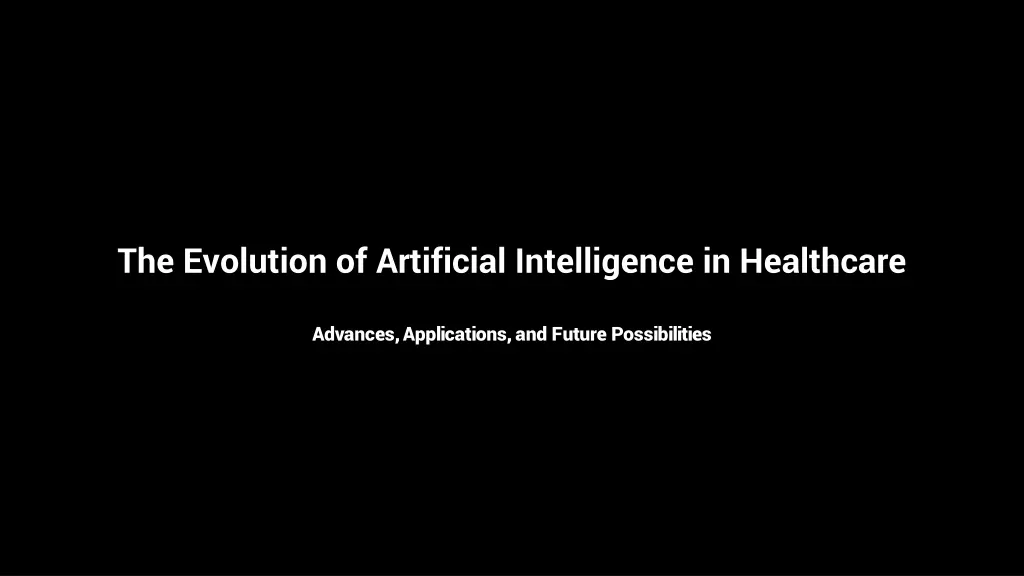
Artificial Intelligence in Healthcare: Advancements and Applications
Explore the evolution of artificial intelligence in healthcare, from AI technology to machine learning in medical imaging, natural language processing in electronic health records, robot-assisted surgery, and chatbots/virtual nursing assistants. Discover how AI is revolutionizing diagnosing, treating, and improving patient outcomes in the healthcare sector.
Download Presentation

Please find below an Image/Link to download the presentation.
The content on the website is provided AS IS for your information and personal use only. It may not be sold, licensed, or shared on other websites without obtaining consent from the author. If you encounter any issues during the download, it is possible that the publisher has removed the file from their server.
You are allowed to download the files provided on this website for personal or commercial use, subject to the condition that they are used lawfully. All files are the property of their respective owners.
The content on the website is provided AS IS for your information and personal use only. It may not be sold, licensed, or shared on other websites without obtaining consent from the author.
E N D
Presentation Transcript
The Evolution of Artificial Intelligence in Healthcare Advances, Applications, and Future Possibilities
Introduction to Artificial Intelligence AI refers to the simulation of human intelligence in machines. It enables machines to learn from experience and experience and perform tasks that typically require require human intelligence. AI has the potential to revolutionize healthcare by healthcare by improving diagnosis, treatment, and and patient outcomes. Examples of AI in healthcare include robotic robotic surgery, virtual nursing assistants, and predictive analytics. Photo by Pexels Photo by Pexels
Machine Learning in Medical Imaging Machine learning algorithms can analyze medical medical images with high accuracy. They can detect patterns and anomalies that may that may be missed by human radiologists. This improves early detection of diseases and reduces the need for invasive procedures. Examples include algorithms for identifying cancerous cells in mammograms and diagnosing brain tumors. Photo by Pexels Photo by Pexels
Natural Language Processing in Electronic Health Records Natural language processing (NLP) algorithms can algorithms can extract meaningful data from unstructured clinical notes. This enables efficient analysis of large volumes of volumes of patient data for research and treatment treatment purposes. NLP can also identify potential adverse drug interactions and improve clinical decision support systems. Examples of NLP applications in healthcare include automated coding, clinical documentation improvement, and sentiment analysis. Photo by Pexels Photo by Pexels
Robot-Assisted Surgery Robotic surgery systems enhance precision and dexterity in surgical procedures. They enable minimally invasive surgeries, resulting in reduced trauma, faster recovery, and better outcomes. Robots can perform complex tasks with minimal human intervention, allowing surgeons to operate remotely. Examples of robot-assisted surgeries include prostatectomy, cardiac procedures, and orthopedic surgeries. Photo by Pexels Photo by Pexels
Chatbots and Virtual Nursing Assistants Chatbots and virtual nursing assistants provide personalized support and information to patients. They can answer routine questions, provide medication reminders, and offer emotional support. These virtual assistants improve patient engagement, reduce administrative burden, and increase accessibility to healthcare services. Examples of chatbots and virtual nursing assistants include Amazon's Alexa, Ada, and Your.MD. Photo by Pexels Photo by Pexels
Predictive Analytics for Patient Outcomes Predictive analytics uses historical patient data to identify patterns and make accurate predictions. It helps healthcare providers anticipate and prevent adverse events, improving patient safety. Predictive models can assist in early detection of diseases, allowing for timely interventions. Examples of predictive analytics in healthcare include readmission risk prediction and sepsis detection. Photo by Pexels Photo by Pexels
Future Directions and Challenges The future of AI in healthcare holds great promise but also significant challenges. Ethical considerations, privacy concerns, and algorithm biases need to be addressed. Integration of AI with existing healthcare systems and workflows is crucial for successful implementation. Despite challenges, AI has the potential to revolutionize personalized medicine and population health. Photo by Pexels Photo by Pexels
